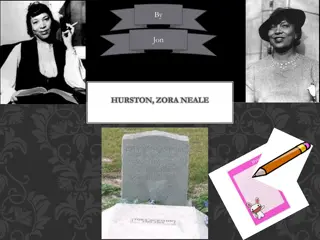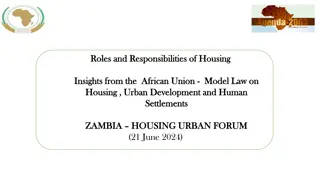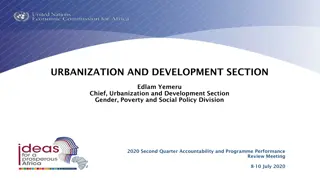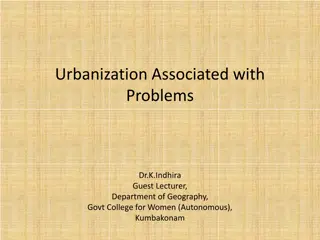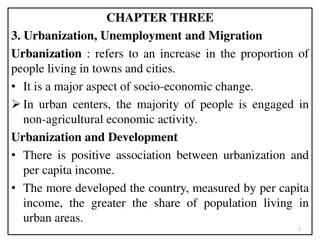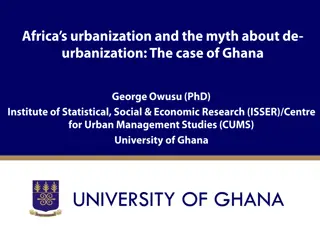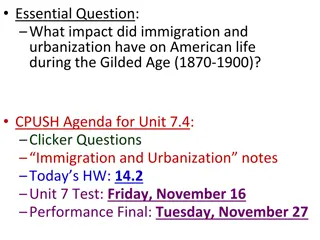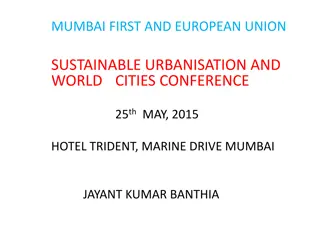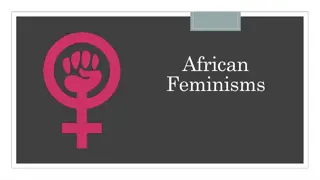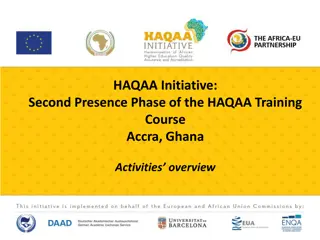Understanding African Urbanization: Challenges and Trends
Unpacking the narratives of African urbanization and cities, this collection explores Africa's unique urban revolution, urban challenges, and the prevalence of informality in its cities. Data and projections highlight the evolving urban landscape across different regions in Africa, emphasizing the significant urban growth rates and population shifts. The case study of Ghana sheds light on urbanization trends and projections from 1921 to 2060, showcasing the transition from rural to urban living over the decades.
Download Presentation

Please find below an Image/Link to download the presentation.
The content on the website is provided AS IS for your information and personal use only. It may not be sold, licensed, or shared on other websites without obtaining consent from the author. Download presentation by click this link. If you encounter any issues during the download, it is possible that the publisher has removed the file from their server.
E N D
Presentation Transcript
Introduction Narratives of African s urbanization and cities Africa s urban revolution Urban challenges African cities and informality Conclusion
Narratives of African urbanization and cities Africa is still rural and practicing communal living. Urbanization in Africa is the same as what happened in the global north though separated by time and space. Africa is de-urbanizing and urban population returning to rural areas: narrative questions urbanization as inevitable and irreversible process. Informality and slum, and large destitute urban population in African cities
Africas Urban Revolution Urban growth rates and city population sizes, 2018-2030
Percentage of urbanized population Regions, 1950-2050 Major area, region, country or area 1950 1970 WORLD More developed regions Less developed regions AFRICA Eastern Africa Middle Africa Northern Africa Southern Africa Western Africa ASIA EUROPE LATIN AMERICA AND THE CARIBBEAN NORTHERN AMERICA OCEANIA/Australia/New Zealand 1990 42.9 72.4 34.8 31.3 17.9 32.2 45.7 48.8 30.2 32.3 70.0 2010 51.6 77.1 46.1 38.3 23.5 41.5 50.5 59.1 41.6 44.8 72.7 2020 56.2 79.3 51.6 42.6 27.9 46.5 52.9 64.0 48.3 51.2 74.7 2030 60.0 81.5 56.2 47.1 32.8 51.5 55.9 68.1 54.1 56.3 77.0 2040 63.2 83.5 59.8 51.5 38.1 56.2 59.5 71.4 58.5 60.3 79.5 2050 66.4 85.4 63.4 55.9 43.6 60.8 63.3 74.3 62.7 64.2 82.0 29.6 54.6 17.6 14.0 5.6 14.0 26.0 37.7 8.4 17.5 51.5 36.6 66.7 25.3 22.6 10.5 22.0 37.1 43.7 18.7 23.7 63.0 41.3 63.9 62.4 57.1 73.8 71.3 70.5 75.4 70.7 78.4 80.8 70.7 81.0 82.5 70.9 83.0 84.2 71.3 84.7 85.9 72.2 86.2 87.4 73.5 Source: World Urbanization Prospects: The 2014 Revision (UNDESA, 2015)
Ghana: Urbanization Trends and Projections, 1921-2060 100% 90% 80% 70% 60% Percentages 50% 40% 30% 20% 10% 0% 1921 1931 1948 1960 1970 1984 2000 2010 2020 2030 2040 2050 2060 Rural 92.2 90.6 97.1 76.9 71.1 68 56.2 49.1 42.8 37.4 33.2 29.5 25.5 Urban 7.8 9.4 12.9 23.1 28.9 32 43.8 50.9 57.2 62.6 66.8 70.5 74.5 Source: Derived from MLGRD/GoG, 2010; GSS, 2013; UNDESA, 2014 (NDPC, 2016)
Africas urban development challenges Weak urban planning and governance systems impact negatively on capacity of cities to provide required infrastructure and services. Massive urban sprawl and intense congestion in inner-city areas. Rapid loss of rural agriculture lands and food insecurity consequences Housing deficit and slums development Environmental degradation High unemployment, especially among the youth.
African cities and informality The crisis of the African city is often blamed on its informal economy. Frequent clashes between informal economic activities/operators and city authorities largely on the issues of location. city planning in many African countries hardly consider informal economic activities. Reality of the informal sector as the largest provider of employment, housing, transport, etc
Conclusion Urbanization in Africa offers huge opportunities but also presents numerous challenges. Areas critical for African cities to achieve SDG 11: City planning and management need to take into account informal economic activities as a true reflection of the African city; View African cities as a system where the different challenges are interconnected with usual common political economy issues; Focus policy and investment attention on secondary cities; Re-theorize African cities and narratives about these cities.




